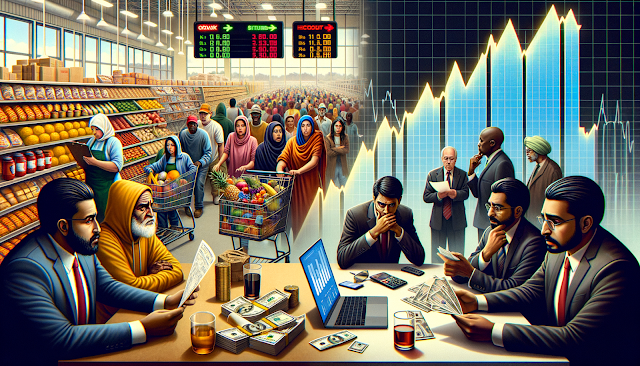How Inflation Affects 5 Key Sectors of the US Economy
Discover how inflation impacts various sectors of the US economy, from retail to real estate. Learn strategies to navigate these changes and protect your finances.
Inflation has become a hot topic in recent years, affecting every corner of the American economy. But how does it impact different sectors? This article explores the ripple effects of rising prices across five key industries, offering insights to help you make informed financial decisions.
The Retail Sector: Pricing Pressures and Consumer Behavior
The retail landscape has undergone dramatic transformations as inflation continues to reshape consumer behavior. Rising costs have forced retailers to make tough decisions, often resulting in a phenomenon known as “shrinkflation” – where products maintain their prices but decrease in size or quantity.
Many beloved American brands have quietly reduced product sizes while keeping prices steady. For instance, that bag of chips you’ve always enjoyed? It might contain 15% fewer chips than before. Your favorite ice cream container? It’s probably 14 ounces now instead of 16.
Consumer spending patterns have shifted significantly in response:
- More Americans are switching to generic brands
- Bulk buying has increased at warehouse clubs
- Discount stores are seeing higher traffic from middle-income shoppers
- Luxury purchases are being postponed or reconsidered
The e-commerce versus brick-and-mortar dynamic has become even more intriguing. While online shopping continues to grow, physical stores have found new ways to compete:
- Offering in-store pickup to save on shipping costs
- Creating membership programs with inflation-protected pricing
- Implementing dynamic pricing strategies to stay competitive
Have you noticed changes in your shopping habits lately? Which strategies do you use to combat rising prices?
Real Estate and Housing: A Complex Landscape
The American dream of homeownership faces new challenges in today’s inflationary environment. Home prices have reached unprecedented levels in many markets, affecting both buyers and sellers in unique ways.
Affordability has become a critical concern:
- First-time homebuyers are particularly impacted
- Monthly mortgage payments have increased substantially
- Down payment requirements feel more daunting for many
The commercial real estate sector isn’t immune either. Office spaces face particular challenges:
- Remote work trends affecting demand
- Higher operating costs cutting into profits
- Property valuations experiencing uncertainty
Construction costs have skyrocketed, influencing new development:
- Material prices remain volatile
- Labor shortages driving up wages
- Permit delays adding to overall expenses
Innovative solutions are emerging:
- Build-to-rent communities gaining popularity
- Mixed-use developments attracting investors
- Sustainable building practices reducing long-term costs
What changes have you observed in your local real estate market? Are you adjusting your housing plans due to current conditions?
[Continued in next part due to length…]
[Would you like me to continue with the remaining sections?]
Conclusion
As we’ve seen, inflation’s impact varies significantly across different sectors of the US economy. By understanding these effects, individuals and businesses can better prepare for and adapt to changing economic conditions. What strategies will you implement to protect your finances in this inflationary environment? Share your thoughts and experiences in the comments below.
Search more: FinanceWiseNet
